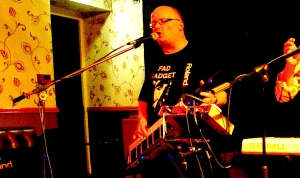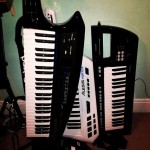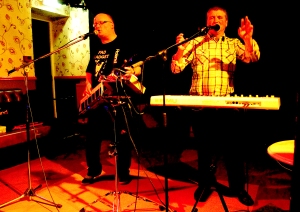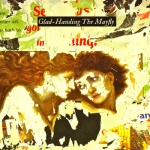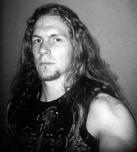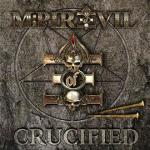Two of the experimental metal five-piece explain why they strive to create music so diverse and unpredictable as well as delving into the world of film and coming up with bizarre song titles.

Iwrestledabearonce’s current line-up
Listening to music that contains screeching guitars and thundering drums? It’s likely some form of heavy metal. With a broken down section, clean then distorted vocals? Probably metalcore. Weird timings and a jazzy style? Undoubtedly experimental prog rock/metal. Added seagull squawk, mariachi part and grindcore vocals shifting into a bit of soul? Then it’s got to be Iwrestledabearonce.
Having made a name for themselves with a unique brand of music that’s rooted in metal but scrapes the surfaces of plenty of other genres, Iwrestledabearonce have been coming up with ridiculous song titles and even more ridiculous songs for over six years now. Last year they underwent a significant change as original vocalist Krysta Cameron departed, swiftly replaced by Courtney LaPlante. Along with bassist Mike ‘Ricky’ Martin (who joined in 2009) the two of them explain why they continue to forge such unique, off the wall music.
“Before I was in the band I knew Steven [Bradley] and John [Ganey, both guitars],” says Ricky. “Our bands all played together and were both just tired of bands that played the same all the way through the song. We don’t listen to just metal, we listen to every kind of music so that was one of the big things; ‘Let’s see how different we can make some of the songs sound.’ Like you could put on one part of the song and it’d be like ‘Guess what? This is the same song as this’ and somebody would be like ‘Doesn’t sound like the same song.’ I think it’s just mostly having fun with what you’re playing too. It’s not fun to play one song and it’s just the same feel all the way through. We think it’s fun to get weird!”
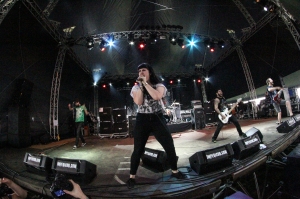
(c) Henry Laurisch
Anyone who has heard their newest album Late For Nothing, the first with Courtney, will understand just how weird it gets. From Steve Vai lending his speedy licks to one track, to the following song being probably the most serious they’ve ever sounded, it’s a mixed bag and more predictable than previous releases, but still works well. The odd song titles, such as ‘Letters To Stallone’ are present as ever.
“We just try to write a song and when someone comes up with an idea they’ll record it on the computer and call name it a stupid name,” Ricky continues. “They’ll send it to somebody and it’ll be like ‘Titty Dick 102’ then after we record the song we’re like what shall we name it? Well ‘Titty Dick 102’ is going to become…‘That’s A Horse Of A Different Colour’.”
Courtney takes over: “But like the one we released with pre-orders, ‘Firebees’, we were like ‘We’re naming a song ‘Firebees’ no matter what!’ because it’s a huge inside joke. But there’s one song I made that’s a really heartfelt song and Steve was like ‘So what do you want to name this one? Mr Silk Underwear?’ And I was like ‘Nooo! This song is about like dramatic failings and I’m not naming it that!”

Say Cheese!
It ended up being ‘Mind The Gap’ much to her relief. Before she hooked up with Iwrestledabearonce for good, Courtney was in Unicron along with her brother, and constantly told they sounded like Iwrestledabearonce which she puts down just to the fact that the band had a female singer not afraid to scream.
“Basically in my old band my brother would make a song and I had to match that song. So he and I went from like listening to Audioslave, Rage Against The Machine to System Of A Down to Between the Buried And Me, Protest The Hero and we kept getting heavier and heavier and my brother’s like ‘This is metal, this is screaming music. So you’ve to learn how to do that.’ So I did and unfortunately it’s recorded and I’m terrible [in the early days].
“You just have to go for it and eventually you need to learn how to do it properly so you don’t hurt your voice. I don’t do it properly so my voice is very tired right now, sometimes I forget and it damages it. I think it’s just the same as learning how to sing properly.”
While Unicron do differ from Iwrestledabearonce they crossover in terms of the unorthodox style they both attest to. It’s this and the fact that Courtney’s got a great vocal range, as demonstrated on Late For Nothing, that means she’s perfectly suited for the bear wrestlers.
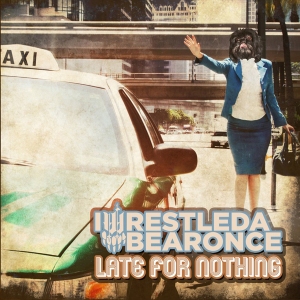
Late For Nothing
“Me and my brother, Jackson, in the band that we started, there would be times where my brother would be like ‘Ok, and then let’s have this happen in the song’ and I’m like ‘Jackson that’s too happy, we’re supposed to be serious.’ It would be like a super-happy pop-punk thing and I’d be like ‘Jackson that’s going to throw people off’ and he’s like ‘I don’t fucking care, let’s do it.’ It’s more fun that way. We all like happy, fun music too and I feel like we all don’t take it way too seriously.”
It’s not just with music that Iwrestledabearonce like to experiment, they’ve also branched out into the world of film, releasing ‘A Beary Scary Movie’ late last year. Part scripted, part reality it’s a mix of horror, comedy and the unexpected.
“It was just kind of all of our idea,” says Ricky. “The guy who does a lot of videos for us is just as dumb as us so he comes up with weird shit and then we’re like ‘Let’s do it!’ The thing is he put the thing together with stuff missing. He’d be like ‘Here’s what’s going to happen in this scene but, I don’t know what you guys wanted to say or do. Just try to make it funny.’
“Then we showed up to do the movie and we had a day to practice and then he would pretty much be like ‘So…what would you say if this happened’ and we’d be like ‘I don’t know, shut the fuck up dick!’ or whatever and just be talking shit and he’s like ‘That’s funny, I like that. Let’s do it!’
It wasn’t an easy process but on the band’s part took significantly less time than recording an album, shooting for one whole week, sometimes doing 15 hour days.
“We shot it in an empty warehouse where they built our set, because it was a good place to do it that’s cheap. So if you watch it there’s scenes where we’re sweating our asses off. We’d be like ‘We have to do that again, everybody wipe down!’
An obvious omission to any new fans of the band is that of Courtney, but that’s because it was just before her time. There are, unsurprisingly, plans to do another one with Ricky keen to get her involved, but Courtney’s got some ideas of her own.
“I said I want to do it,” says Courtney, excitedly. “I want to have a horror movie but it’s a musical. [To Ricky] Remember that’s my idea? I want it to be scary but then like [starts singing] ‘We’re running from the ghosts, we’re running from the ghosts’ Haha!”
“I want a choreographed dance scene, that would be great,” adds Ricky.
But can any of them dance?
“If the Jackass guys can dance, we can dance,” he laughs. “We’re built for Broadway!”
New York better watch out!






